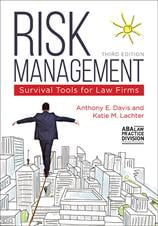Hiring a Legal Management Professional
Evaluate Your Firm’s Needs
Law firms of every size are evaluating their business management needs and looking to fill those needs with professional managers. A legal management professional enables lawyers to spend more time practicing law and developing business rather than managing the office. Before a professional manager is brought into your firm, be certain the lawyers are ready and willing to relinquish their day-to-day operational responsibilities, and that the firm’s culture supports a step in this direction.
It's also helpful to consider factors, such as the firm’s need for people who are skilled in specific functional areas, including technology, finance, strategic planning, marketing and client development, and/or staff management.
In addition to the immediate needs of your firm, it may be useful to consider employment trends in law firms across the country. ALA offers several resources to help you with this process, including:
- Legal Management article, "Teaming Up: Adopting New Approaches for Today's Legal Secretary"
- A white paper outlining "The Changing Role of the Legal Secretary"
- ALA and Novitex's 2016 Report on Trends Impacting the Legal Industry
- ALA's annual Compensation and Benefits Survey
Qualifications, Skills and Abilities
The Association of Legal Administrators conducted extensive studies and analyses of the legal management occupation. Data were collected from hundreds of legal managers and managing partners, resulting in the identification of the specific competencies critical for successful job performance. In summary, they include:
◾ A thorough understanding of accounting and financial principles. Effectively managing a law firm’s finances means a legal manager should have a solid understanding of general accounting procedures, financial management and analysis, and tax regulations, as well as the ability to implement solid internal controls and collection and billing procedures.
◾ Strong human relations skills. Human resources management is an important component of a law firm’s overall business success. It is important for a legal manager to be aware of changing employment laws and the many details relating to recruiting, hiring, compensation, benefits, performance appraisals, discipline and discharge, and labor relations in general. Also, because personnel and fringe benefits are a significant portion of a firm’s operating expense, it is crucial for individuals in this role
◾ Knowledge of legal industry matters. This would include matters such as professional liability and conflict of interest.
◾ Technology and project management skills. Rapid advancements in technology point to a strong need for someone who is not only computer literate, but also has a solid understanding of systems, software, hardware
◾ Communication skills, both written and oral.
◾ Leadership and negotiation skills.
When it comes to educational credentials, many legal managers are CPAs and/or have advanced degrees. While a college degree should not necessarily be a requirement, it is certainly desirable. However, prior employment within your own or another respected law firm can also provide excellent experience and an understanding of the law firm work environment — and this experience may be as valuable as a college degree. A Certified Legal Manager (CLM)® or other professional business designation is another validation of a person’s knowledge and skills. Paralegals, retired military personnel
The bottom line? You need You
*CLM is a registered mark of the Association of Legal Administrators
